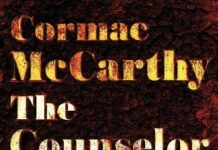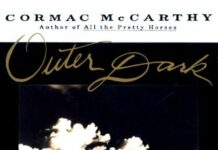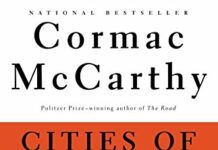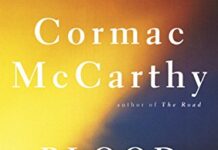
Ebook Info
- Published: 2010
- Number of pages: 305 pages
- Format: MOBI
- File Size: 1.05 MB
- Authors: Cormac McCarthy
Description
In this final volume of The Border Trilogy, two men marked by the boyhood adventures of All the Pretty Horses and The Crossing now stand together, in the still point between their vivid pasts and uncertain futures, to confront a country changing or already changed beyond recognition.In the fall of 1952, John Grady Cole and Billy Parham–nine years apart in age, yet with a kinship greater than perhaps they know–are cowboys on a New Mexico ranch encroached upon from the north, at Alamogordo, by the military. To the south, always on the horizon are the mountains of Mexico, looming over El Paso, Ciudad Juárez and all the cities of the plain. Bound by nature to horses and cattle and range, these two discover that ranchlife domesticity is compromised, for them and the men they work with, by a geometry of loss afflicting old and young alike, those who have survived it and anyone about to try. And what draws one of them across the border again and again, what would bind “those disparate but fragile worlds,” is a girl seized by ill fortune, and a love as dangerous as it is inevitable.This story of friendship and passion is enfolded in a narrative replete with character and place and event–a blind musician, a marauding pack of dogs, curio shops and ancient petroglyphs, a precocious shoe-shine boy, trail drives from the century before, midnight on the highway–and with landforms and wildlife and horses and men, most of all men and the women they love and mourn, men and their persistence and memories and dreams.With the terrible beauty of Cities of the Plain–with its magisterial prose, humor both wry and out-right, fierce conviction and unwavering humanity–Cormac McCarthy has completed a landmark of our literature and times, an epic that reaches from tales of the old west, the world past, into the new millennium, the world to come.
User’s Reviews
Reviews from Amazon users which were colected at the time this book was published on the website:
⭐Lots of Spanish, like the two books prior of the trilogy. You don’t have to be fluent, but some vocabulary is required as McCarthy does not translate… but he masterfully transports the reader into his narrative. Heartbreakingly beautiful in verse and imagery, anybody with a romantic heart and an appreciation for the old values and integrity would enjoy this book.
⭐”Quinquagesima Sunday in the predawn dark she lit a candle and set the candledish on the floor beside the bureau where the light would not show beneath the doorway to the outer hall.”In the historic calendar of western Christianity, the Sunday before Ash Wednesday – the beginning of Lent – is known as Quinquagesima (50 days). From antiquity the church has assigned an episode from the life of Christ as recorded in Luke chapter 18 to be read on that day. Here, in so many words, Jesus tells his disciples that it’s time for his work to end; he will go to Jerusalem, confront evil and be killed. For their part, the disciples fail to grasp his meaning, though the fault it would seem is not entirely their own. Luke writes, “This saying was hidden from them.”Throughout his Border Trilogy, McCarthy has been examining the nature of things which are unable to ever be fully known, things hidden from view. Those things which, despite our inability to put a name to them or our best failed attempts to measure them, possess an ancient power. “Immanence” is what the ancients came to call it: the thought that a thing can somehow be real in the world and yet transcend that world. The idea has been troubling the minds of mystics of every progressive culture for at least five millennia, if the record is to be believed. From Abraham through Hesiod and Homer, first-century Buddhist holy men, through the ante-Nicene Fathers up through Spinoza and finding its way into the lyrics of Tom Waits. Things which are even if you can’t quite put a finger on them. Cormac McCarthy captures this spirit with an eloquence rarely witnessed in American letters.”A man was coming down the road driving a donkey piled high with firewood. In the distance the churchbells had begun. The man smiled at him a sly smile. As if they knew a secret between them, these two. Something of age and youth and their claims and the justice of those claims. And of the claims upon them. The world past, the world to come. Their common transiencies. Above all a knowing deep in the bone that beauty and loss are one.”Just prior to that incident in Cities of the Plain, John Grady has left a Mexican bordello where he has – he is convinced – found love. It is characteristic of the Border Trilogy that characters cross boundaries both geographic and mythic, leading to encounters both real and transcendent of reality. Transgression, by definition, is the result: borders crossed that must otherwise remain inviolate.And one begins to question whether this miracle of a writer is going soft; McCarthy’s view in Cities of the Plain is an unapologetic and steadily backward gaze at a world that once was, though perhaps, in reality, a world that never was and could never be. The novel is surely his most romantic work, inhabited by a protagonist resolved to fulfill a calling, quixotic as it may be. What calling? Beauty and its redemption from that which would corrupt it into something unrecognizable. In other hands this would turn into unbearable melodrama. McCarthy lets it be what it is, and lets the wheels of his characteristically dark-hearted mill grind out its result with the material it’s fed.And so John Grady sets out, determined to free a Mexican prostitute – Magdalena, by name – take her to wife, and set up home in the Jarilla hills of west Texas. His heroism, in a decidedly Greek cast, is marked by the sense that perishing in battle for a noble cause is a fate preferable than that of having one’s convictions called into question after death.Hamlet’s admonition to Horatio – “more things in heaven and earth than are dreamt of in your philosophy” – echoes here, as McCarthy balances masterfully the slow burn of a Texas ranch hand attending to the mundane, yet all the while permeating this with the understanding that more vital matters await. Indeed, once John Grady’s rescue plan has been hatched the intervening episodes transition into that inevitable ticking clock of subject-verb-object prose. Sentence after sentence the likes of “he swipes the plate with the last of the tortilla and eats it and takes his breakfast dishes to the sink”. Time passes audibly. The cowboy’s “almost blunted purpose” is palpable. McCarthy stokes the urge to jump up from one’s chair in frustration and shout at the book “go get the girl already”, though the suspicion – if not the knowledge – is strong of where that will lead.And so we are left with the quite intentional imagery of Quinquagesima Sunday, the final preparation of the devout for the hell about to be unleashed upon both the evil and the just, of lambs led to slaughter.The urge to ask why the world is this way is nearly as old as the world itself. McCarthy’s encouragement here comes with the act of dogged perseverance that marks those who inhabit his worlds. In Cities of the Plain it is clear through their actions that the desire is strong in these characters for those things which might represent order , yet the writing is never sentimental. The naturalism of McCarthy’s prose provides us with characters of a hard reality, men familiar with suffering, women acquainted with grief. Characters caught in the insularity of an impersonal universe, a persistent, dark night of the soul, but one marked by fleeting sparks of light of an ineluctable beauty.There is so much in this universe, which despite our righteous desire to uncover its meaning, can only be known when it is set to be known, set to be revealed. Only a fool would set himself to believe otherwise. Highly recommended.
⭐And you be me when I am oldThe world grows coldThe heathen rageThe story’s toldTurn the page.This is a great dedication to Cormac McCarthy’s 3rd book in his Border Trilogy and a realism of his choosing to bring it to its culmination. I’ve read a lot of McCarthy’s books and each time he “literally” blows me away.This novel is hard to capture in a review because there is so much going on and so many interesting characters and events that being too selective diminishes the novel. Since you already know the storyline, I’ll limit my review to my reactions to the novel. I love the way Cormac handles the spoken word in this trilogy. His main protagonists are two cowboys in their early to late twenties and their incessant lingo, sitting horses, and constant spitting evokes an image of this place and era (mid 1900s) that is spot on.John Grady and Billy Parham return in this final novel to draw together the first two books and round out the life of the two cowboys presently punching cattle for a widower rancher. Since this kind of life in southern New Mexico’s hard scrabble land is harsh, it was good to see that their employer took great pains to keep good care of them, feeding them well, respecting their opinions, especially his favorite–John Grady. John Grady was my favorite as well and I don’t think they make many like him anymore: handy, polite, respectful, resilient, humble but confident, excellent at breaking and/or getting the best out of horses and dogs and people, dependable, hard working, faithful and passionate to a fault.The story covers many aspects of a life of ranching but focuses on Billy and Grady’s friendship told in the fierce beauty and desolation of countryside that few could capture, as does McCarthy. The story is peopled with interesting characters that are fleshed out so that you feel you know them almost as well as the main characters.McCarthy can capture the typical speech patterns of unschooled cowpokes as easily as he does the visceral complex conversations that populate the book. “Daybreak to daybreak for a godgiven dollar, said Billy. I love this life. You love this life, son? I love this life don’t you? Cause by god I love it. Just love it.”John Grady’s demeanor charms most of the other characters including an old blind maestro he meets in a whorehouse/bar. Grady grows so fond of the maestro that he asks him to serve as the padrino for his bride. The maestro’s thoughtful explanation upon being asked but refusing to be the padrino gives insight into McCarthy’s ability to use words like few writers today. “He was not a man given to illusions He knew that those things we most desire to hold in our hearts are often taken from us while that which we would put away seems often by that very wish to become endowed with unsuspected powers of endurance. He knew how frail is the memory of loved ones. How we long to hear their voices once gain, and how those voices and those memories grow faint and faint until what was flesh and blood is no more than echo and shadow. In the end perhaps not even that.He knew by contrast that our enemies seem always with us. The greater our hatred the more persistent the memory of them so that a truly terrible enemy becomes deathless. So that a man who has done you great injury or injustice makes himself a guest in your house forever. Perhaps only forgiveness can dislodge him.”Brush up on your Spanish because there is a lot of it in the storyline that isn’t translated. Most can be figured out by the words or the context but this twist, so like McCarthy, added a degree of reality to the book, that while a tad frustrating at times, added to the overall atmosphere.It was hard to put this novel down. In fact, I reread many parts and they still continue to elicit the same deep wrenching, almost reverent, responses. While the story often brings a chuckle and the action never abates, it is the ending that will bring you to your knees. While it wasn’t what this reader may have wished for the two friends, it would appear this was really the only end to the paths that each had chosen. “Men imagine that the choices before them are theirs to make. But we are free to act only upon what is given. Choice is lost in the maze of generations and each act in that maze is itself an enslavement for it voids every alternative and binds one ever more tightly into the constraints that make a life”
⭐Cities of the Plain concludes McCarthy’s much-lauded Border Trilogy. Once again we are in the sparse, unforgiving territory of the US/Mexico border, bringing Billy Parham’s story into the 1950s and the wider social change that took place. As usual, it is a book of brilliant, cinematic writing, steeped in the power of landscape and animals, but also spoiled in places by semi-religious and surreal pontificating that takes the story nowhere.
⭐Frrom boyhood when I used to watch Westerns with my Dad on a 12″ screen B&W TV I have been a lifelong aficionado of novels and films about the American West. I love Cormac McCarthy’s Border Trilogy, having read each of the 3 novels in sequence, I have no doubt that I will re-read them. McCarthy’s use of language is brilliant, poetic, and my advice is to savour his writing, resisting the temptation to turn the pages too quickly while following the action. The novel deals with time-honoured themes of loyalty, courage, love and death. Buy Cities of the Plain.
⭐As the final book of the trilogy, Cities of the Plain is perhaps slighter than the first two stories – but no less moving and tragic for that. McCarthy offers us little hope in the stories of John Grady Cole and Billy Parham, both essentially good characters who suffer for their love of horses and the cowboy way of life. The ending is somewhat arcane and you need to stick with it to discover the message of the entire trilogy. I can give this work no higher endorsement than to say that I started riding lessons as a result of the way he describes man’s complicated relationship with the horse!
⭐This is the concluding book in the trilogy, and is a superbly eloquent telling of the final part of the story of the central characters. It is achingly beautiful in the simple language and un fussy prose used to tell the tale of exhausting physical work, grand landscape, and men of few words. I was lost when it was finished.
⭐McCarthy brings everything to life, I have never been there and probably never will, but I see the countryside and feel its emptiness and small kindnesses and daily struggle
Keywords
Free Download Cities of the Plain: Book 3 of Border Trilogy (The Border Trilogy) in MOBI format
Cities of the Plain: Book 3 of Border Trilogy (The Border Trilogy) MOBI Free Download
Download Cities of the Plain: Book 3 of Border Trilogy (The Border Trilogy) 2010 MOBI Free
Cities of the Plain: Book 3 of Border Trilogy (The Border Trilogy) 2010 MOBI Free Download
Download Cities of the Plain: Book 3 of Border Trilogy (The Border Trilogy) MOBI
Free Download Ebook Cities of the Plain: Book 3 of Border Trilogy (The Border Trilogy)





